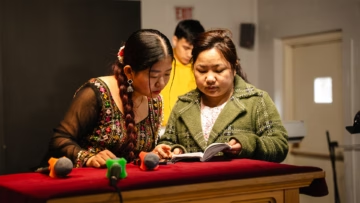
Some things are hard – really, really hard.
Perhaps at the top of the list of really, really hard things is to be a follower of Jesus who is becoming more like him. Becoming more like Jesus is made more challenging when the patterns and pressures of our contexts, our communities, and our cultures constantly attempt to squeeze and force us into their molds: molds that look nothing like Jesus. To not be conformed to the patterns of this world, as we are urged in Romans 12:1-2, is really, really hard.
Followers of Jesus are not immune to these pressures… Before long, the Church can begin to reflect society rather than the Savior.
One of the patterns and pressures of our current society is the tendency to embrace and increase division, polarization, and animosity. We see it all around us, and so easily we can be squeezed into this mold.
Societal division and polarization are not new things. However, most people would agree that they have increased significantly in recent years. Many factors have contributed to the increase. Among these would be the prevalence and ease of social media, the turmoil caused by the global pandemic, and contentious political elections.
Followers of Jesus are not immune to these pressures and, without conscious and intentional decisions to be different, can so easily be squeezed into society’s mold. Before long, the Church can begin to reflect society rather than the Savior.
Jesus was aware that his disciples would face these pressures. He desperately wanted his followers to stand out from society rather than being swallowed up by it. His prayer in John 17 reveals his longing for followers who resist division and polarization. “My prayer is not for them alone. I pray also, for those who will believe in me through their message, that all of them may be one, Father, just as you are in me and I am in you. May they also be in us so that the world may believe that you have sent me.” (John 17:20-21)
Jesus was concerned for the relationships that would exist among his followers. He was also concerned for his relationship with those who were not yet his followers. His prayer for the unity of his disciples concludes with these words: “so that the world may believe that you have sent me.” Jesus was concerned, passionately concerned, for those who did not yet believe. He came to seek and save the lost, and he prayed that the togetherness of his followers would be a missional witness to those who do not yet believe. The world needed Jesus to be sent and to come. The world needs the followers of Jesus to be together in mission so that they might believe in him.
The world needs the followers of Jesus to be together in mission so that they might believe in him.
From its earliest days, the primary self-identity of the Brethren in Christ was one of brothers and sisters. Our almost 250-year history has provided many challenges to this family. Through all these challenges we have remained steadfast in our desire to be a family of love-bonded brothers and sisters who seek to experience God’s love and grace, believe and obey the Bible, worship God, follow Jesus, belong to the community of faith, witness to the world, serve compassionately, pursue peace, live simply, and rely on God.
These values provide a center around which we can stand together in unity and love.
My prayer for the Brethren in Christ is that we remain true to our heritage, our identity, and our values as we focus on knowing and following Jesus. As we become closer to him, we will become a stronger and closer community of believers that is burdened for people who do not yet believe—just as Jesus was. And as we become more concerned for the world that does not yet believe, we will together live as Jesus lived—a sent and sacrificial life.
This article was originally published in our 2022 Annual Report.



